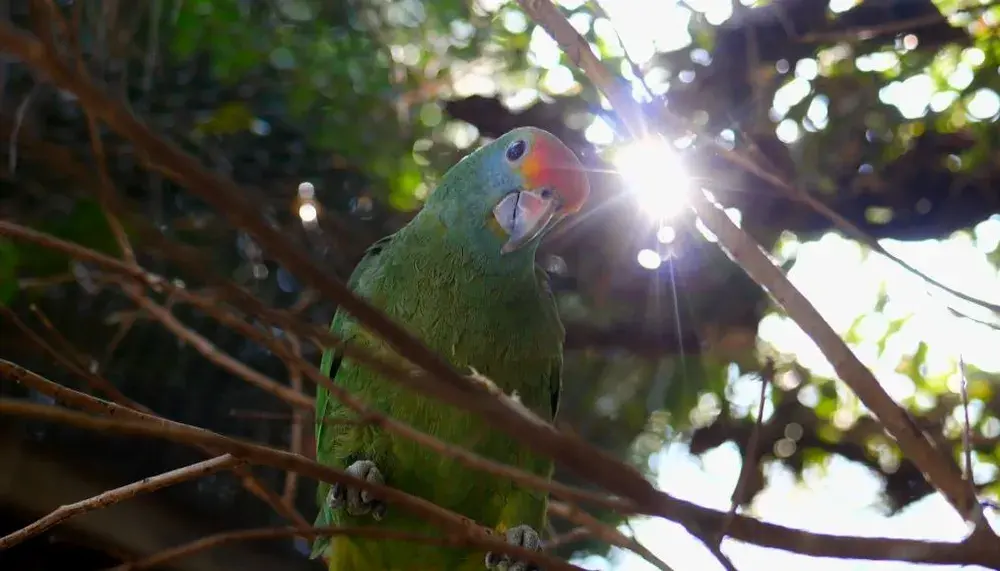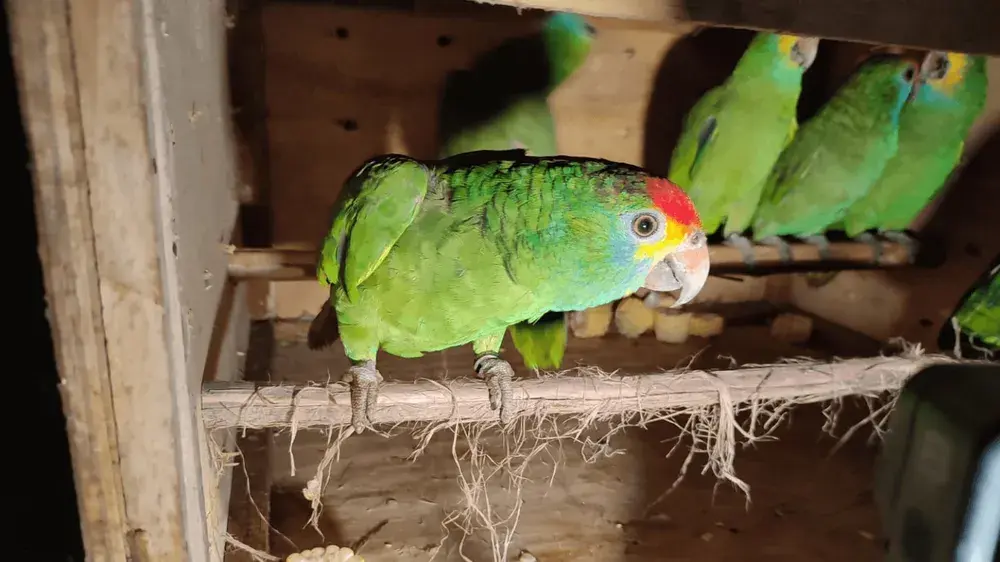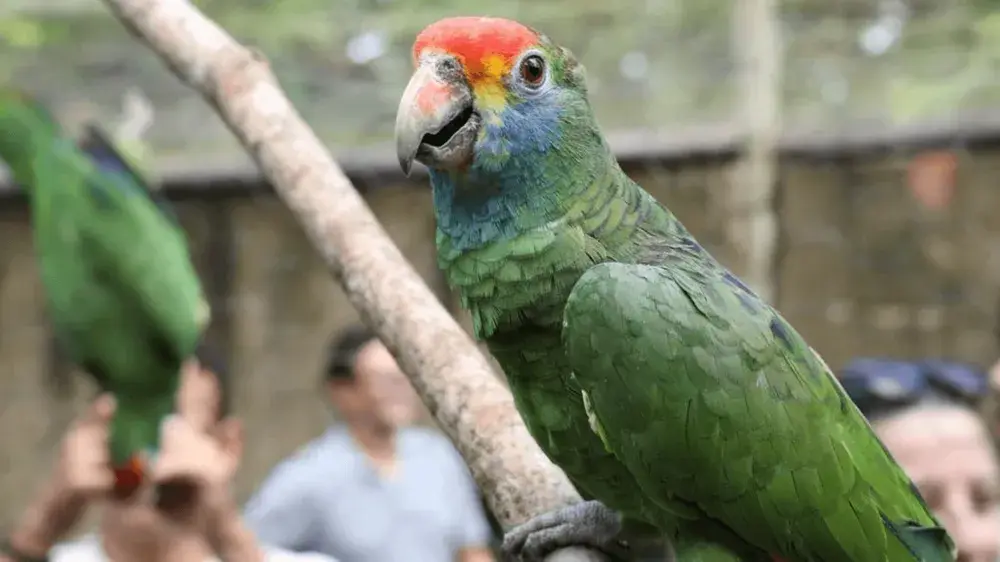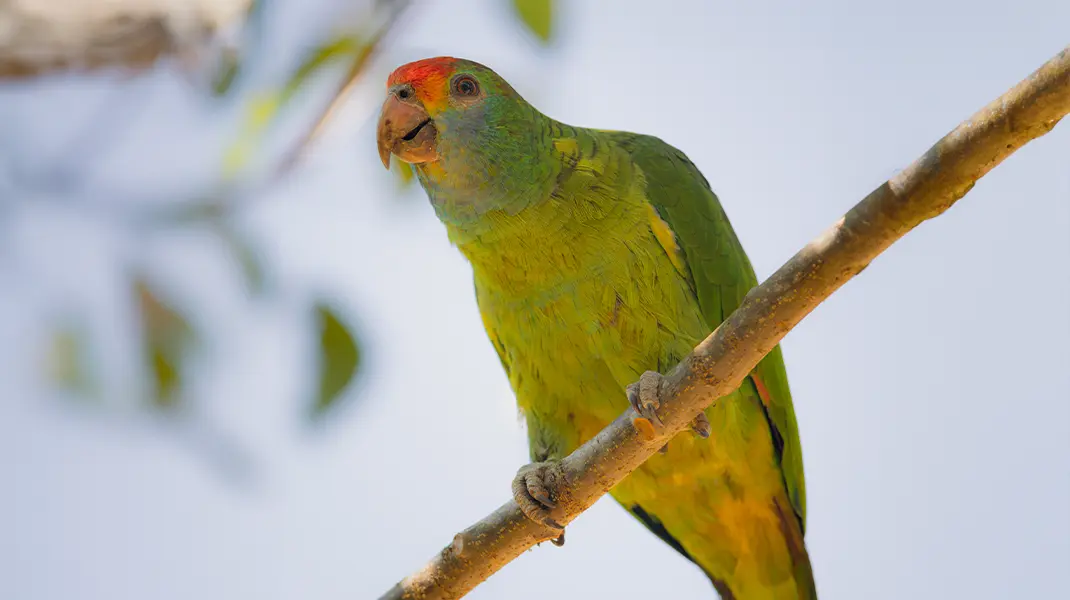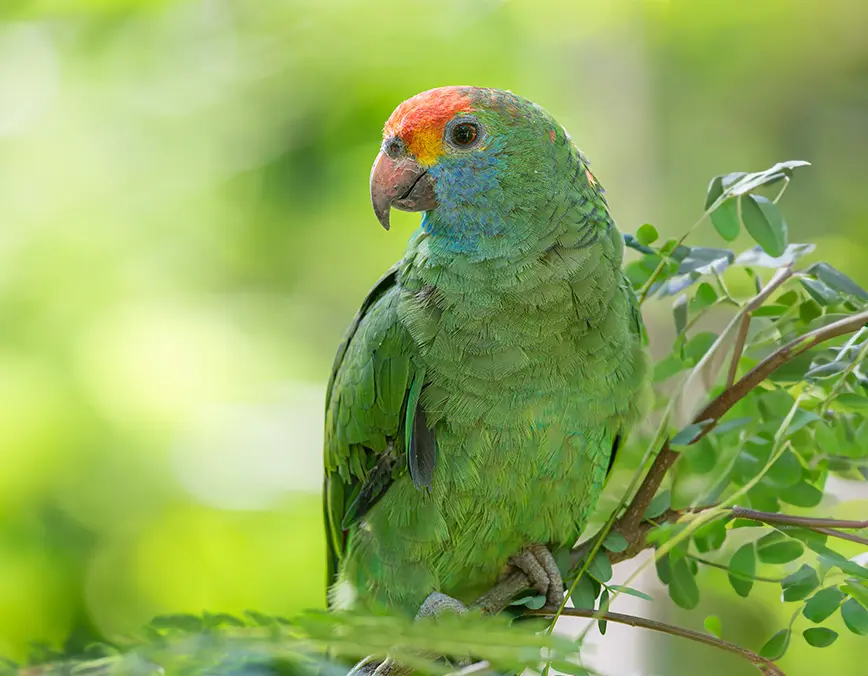
Chauá parrot
Learn about the work of various entities to prevent the trafficking of wild animals, such as the chauá parrot, and reintroduce them into the wild.
60 lives saved from wildlife
trafficking
The Atlantic Forest is the most deforested biome in Brazil, with small incursions into Paraguay and Argentina as well.
In addition to the fragmentation and decharacterization of the forest, several species suffer from the trafficking of wild animals, and, consequently, become part of the list of animals threatened with extinction. Among these species is the chauá parrot (Amazona rhodocorytha), an endemic species of the Atlantic Forest.
The parrot used to be abundant in its rainforest habitat, but its numbers have been decreasing each year. The main threat faced by the species is habitat degradation, as most of the forests have been deforested by logging companies and converted into pastures and plantations. Another major threat is wildlife trafficking.
For all these reasons, the International Union for Conservation of Nature (IUCN) included the chauá on its Red List of Endangered Species as an “endangered species”.
In November 2021, a joint action by the Federal Police, the Brazilian Institute for the Environment and Renewable Natural Resources (IBAMA), and the Chico Mendes Institute for Biodiversity Conservation (ICMBio), from the states of Espírito Santo, Rio de Janeiro, Bahia and Minas Gerais, arrested members of a criminal organization that trafficked wild birds. One of the trafficked species was the chauá parrot, removed from its natural habitat, mostly from forest reserves in Espírito Santo, and placed in small boxes to be sold on the illegal market. Eight people involved in this crime were identified and will face legal action.
In total, 60 chauá parrots were rescued and later sent to the CEP ARCA Project: Assessment, Recovery and Conservation of Animals Threatened with Extinction of the Pernambuco Endemism Center, coordinated by Professor Dr. Luís Fábio Silveira, from the Zoology Museum of the University of São Paulo. This project has financial support from the São Paulo Research Foundation (FAPESP).
After several months of intense care, all 60 parrots were rehabilitated and sent to the Institute for the Preservation of the Atlantic Forest (IPMA) in Alagoas, where the species is now extinct. Transporting so many birds together was not an easy task. The parrots were transported by plane with support from BluestOne.
The birds left São Paulo and went straight to Alagoas, where they were released into the Atlantic Forest, in preserved and monitored areas. Before release, the parrots underwent a rehabilitation process that involves, among other aspects, the development of flight muscles, received food found in the region, and underwent clinical examinations, preventing the spread of diseases to birds in the wild.
Of these 60 birds, 40 were rehabilitated at the Lymington Foundation, where, for over 20 years, one of the founders, Mr. Willian Karl Wittkoff (affectionately known as Mr. Bill), has dedicated his life to the conservation of endangered birds, such as the golden parakeet, the hyacinth macaw, the Lear’s macaw, and the purple-bellied parrot.
The other 20 birds were newborn chicks and, therefore, were sent to the Sergio Polezel breeding facility, which has experience with breeding since the first day of life.
The pre-release training process will take place at the Pedro Nardelli Environmental Education Center, located at Usina Utinga, in Alagoas. This Center already has under its care a pair of Alagoas curassows, recently reintroduced in the same region. IPMA is the manager of the Center, whose president is environmentalist Fernando Pinto. After rehabilitation, the parrots will be transferred to enclosures built in the middle of the forest, where they will finally be released, scheduled for 2023.
The project was only possible with the joint work of several entities, such as the sugar and alcohol sector of Alagoas, the Alagoas Environmental Institute (IMA/AL), State Secretariat for the Environment and Water Resources (SEMARH), State Environmental Institute Environment and Water Resources of Espírito Santo (IEMA), IBAMA of Espírito Santo, Environmental Police Battalion of Alagoas (BPA) and the Public Ministry of Alagoas, with the award-winning PRÓ-ESPÉCIES program, encouraged and coordinated by prosecutor Dr. Alberto Fonseca.
The Lymington Foundation received another 22 chauá parrots from IBAMA, in Porto Seguro-BA, from the seizure of traffickers and from a breeding site in Rio de Janeiro. The animals are undergoing rehabilitation and will soon join the other 60 from Alagoas to return to the wild.
BluestOne is proud to partner with the Lymington Foundation. We invested in the foundation so that it can intensify its breeding work for these species, with the aim of taking all the chicks born in the breeding facility to be reintroduced into the wild, helping to remove them from the risk of extinction.
This is the first reintroduction project for the species, starting with approximately 100 in the wild. Together, we will conserve biodiversity!

